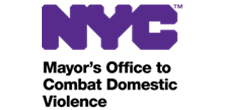City Expands Mental Health Services to Domestic Violence Survivors at Brooklyn and Queens Family Justice Centers
Result of partnership between First Lady Chirlane McCray's ThriveNYC initiative, Mayor's Office to Combat Domestic Violence, the Chapman Perelman Foundation, NYC Health + Hospitals and Columbia University Medical Center One-stop Centers provide comprehensive services to domestic violence victims and their children, regardless of income, language, immigration status, gender identity or sexual orientation
Feb 08, 2017

The Mayor’s Office to Combat Domestic Violence (OCDV), in collaboration with NYC First Lady Chirlane McCray’s ThriveNYC initiative, NYC Health + Hospitals (Health + Hospitals), the Department of Psychiatry at Columbia University Medical Center (CUMC), and sponsored by the Chapman Perelman Foundation, have expanded mental health services to the NYC Family Justice Centers (FJCs) in Brooklyn and Queens. This is an expansion of a 2014 innovative pilot program that brought on-site clinical psychiatric services to the FJC in the Bronx. The program provides psychiatric support to domestic violence survivors through psychiatric evaluations, psychopharmalogical treatment and psychotherapy, regardless of health insurance status.
Mental health services at the FJCs address a compelling need and a critical piece of trauma-informed care. One in five survivors experiences a new-onset mental health illness after experiencing intimate partner violence. However, obtaining mental health care is a need that has historically gone unmet for this population, as life-threatening risks and taking care of other basic needs such as seeking shelter take priority.
“When victims of intimate partner violence reach out for help, support from the City should be there for them. The Family Justice Centers provide aid onsite that is easy-to-navigate. Expanded mental health services will improve the well-being of clients and increase their ability to take advantage of employment, education and other opportunities. Mental health challenges affect every family and every community, but that is especially true for those who have suffered at the hands of their partners. One in five survivors experiences a new-onset mental health illness after intimate partner violence. Thanks to the partnership of Health + Hospitals, Columbia University, and the Chapman Perelman Foundation, we are expanding mental health services to survivors at our centers in Brooklyn and Queens,” said First Lady Chirlane McCray, who spearheads the City’s mental health and substance misuse efforts.



Each FJC is partnered with a NYC Health + Hospitals facility in close proximity to the FJC that will oversee, supervise and hire the staff to provide services to the program: NYC Health + Hospitals/Lincoln for the Bronx FJC, NYC Health + Hospitals/Kings County for the Brooklyn FJC and NYC Health + Hospitals/Queens for the Queens FJC. Each FJC has an on-site, full-time psychotherapist and part-time psychiatrist. There is also a full-time administrator who sits off-site at the Health + Hospitals facility.
Expanding mental health care to all of the NYC Family Justice Centers is one of the 54 initiatives in First Lady Chirlane McCray’s ThriveNYC program and is coming to fruition in partnership with NYC Health + Hospitals and CUMC, with additional support from the Chapman Perelman Foundation. Soon every client receiving services at a Family Justice Center will be able to access mental health care at the same location where they are receiving legal assistance, case management and safety planning, economic empowerment services and services for their children.
The co-located model at the NYC Family Justice Centers is an ideal setting for accessing mental health care because survivors do not have to choose between those needs. Treatment is delivered in a supportive environment where service providers act as a team to help survivors meet a diversity of goals that are more likely to achieve long-term stability after the abuse. This mental health program would be able to accommodate 6,000 visits per year for 1,000 clients per year.
New Yorkers in every borough can access the City’s Family Justice Centers by simply walking in during business hours – from 9:00 AM to 5:00 PM, Monday through Friday – or by calling 311.